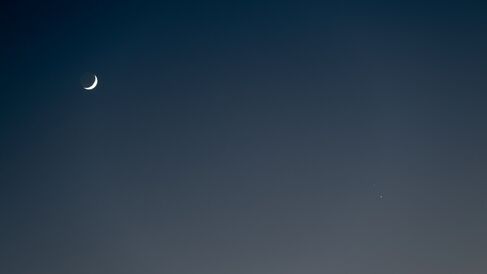Online from Greenwich, UK

About
On March 26, UK clocks will flip forward from Greenwich Mean Time to British Summer Time. The lengthening days after six months of relative darkness can seem like a blessing. But some of us have cause to think twice about the value of long days, and this week we may be turning our attention to Greenwich for more than just Mean Time:
Imad Ahmed is a first-year postgraduate researcher at the University of Cambridge, researching how British Muslims interact with the lunar calendar. He is also a qualified educator and the director of the New Crescent Society. This Wednesday evening, he'll be at the Royal Observatory, Greenwich, co-hosting a moon-sighting podcast with Royal Observatory astronomer Jake Foster. Their goal? To sight the new crescent moon, marker of the opening of the Muslim month of Ramadan--and to help others understand how to undertake this astronomical task.
Why does moon rise matter?
The month of Ramadan is a significant moment in the Muslim calendar. For 29 or 30 days (depending on the next new moon's sighting), Muslims around the world will rise before dawn for breakfast and then abstain from eating and drinking throughout daylight hours. As darkness falls, the fasting is broken with a shared Iftar meal.
So at this moment in the Islamic calendar, the sight of the new moon not only ushers in a new lunar month, but marks the start (and four-and-a-bit weeks' later, the end) of the month-long fasting practices.
As the Royal Observatory website explains:
“For thousands of years, humans have used the Moon to help mark time and the seasons. The Moon's regular cycle in the sky allows people to determine the number of months in a year, keep track of the changing seasons or mark the start of religious festivals.”
Moon-watching is also a focal part of Imad's research, as he explains:
“The Islamic calendar is a lunar calendar, which means months begin with the sighting of the New Crescent. My research looks into how Muslims across the British Isles interact with the moon and differ in their approaches to the calendar.”
So why is moon-spotting important this week?
“On Wednesday 22 March, Muslims across the UK will be looking for the moon that marks the beginning of Ramadan. If the moon is seen, the month of Ramadan can commence and fasting will begin from Thursday. If the moon is not seen, then we would have to wait an additional day and fasting would begin on Friday.
“I will be at the Royal Observatory Greenwich running a special livestream between my organisation (New Crescent Society) and the Observatory, seeing if we can glimpse the moon from London. We will also have people call in live from around the country!”
Interested in learning the best approach to see the new crescent Moon?
Tune in to the Royal Observatory podcast, live online from 6:30pm Wednesday. Together, Imad and Jake will cover topics including the links between astronomy and Islam, the Islamic calendar, and how the best moon-spotting strategies.
Watch it live on the Royal Museums Greenwich website, or watch the stream on YouTube or Facebook.
Read more about Imad and his PhD research on the Faculty of Divinity website.
Curious about Ramadan: the month of fasting?
This simple explanation of Ramadan has been provided by Reshmin H. and circulated by the University of Cambridge's Race Equality Network:
“Ramadan is the ninth month of the Islamic lunar calendar. During the month of Ramadan, Muslims fast from dawn to dusk. They abstain from food, drink and sexual relations during the fasting hours. It is also about refraining from impure thoughts, words and actions. It is to stay away from harming others, and controlling one’s speech, hearing, and what one looks at.
“Some people are exempt from fasting. They are the elderly, children, the sick, travellers, pregnant and nursing women and menstruating women who are all exempt from fasting. If they are able, they can make up the fasts later.
“During Ramadan, Muslims still study work, shop and lead their daily lives. The month of Ramadan is when the Qur’an, the holy book the Muslims believe in, was revealed to the Prophet Muhammad, (peace be on him).
“Muslims fast because Allah, God, commands Muslims to fast in the month of Ramadan. It is a time of self-reflection and improvement. Fasting helps one to feel compassion and care for those in need. It encourages one to give in charity and be more grateful for their blessings.
“The main purpose of fasting is to attain God consciousness. The Arabic word for this is taqwa. Taqwa is knowing that Allah is aware of all actions, words, and thoughts. It is what makes one do the right thing and stops one from doing wrong, even when they are alone. Fasting helps one to develop God consciousness and self-control for the rest of the year. It is a means to develop these virtues. Eid-ul Fitr marks the end of the month of Ramadan and it is a time of celebration for Muslims all over the world.”
(The featured photograph is by Stephen Rahn. It has been licensed for unrestricted use and published on StockSnap (CC0).)
